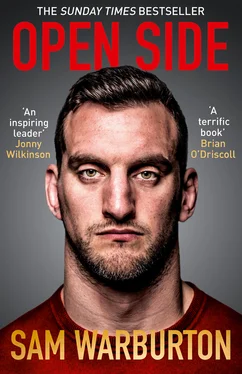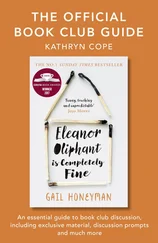Don’t worry about it, Andy says. These things are subjective, which means they’re out of your control. Rugby’s not figure skating or gymnastics, where the judges’ role is paramount. It doesn’t matter whether you win player awards or not. What matters is that you play well enough to be in with a shout, and I’ve certainly done that.
Monday, 9 May. The season is over, and I’m at home thinking about an upcoming week’s holiday in Portugal with Rach.
My mobile rings. I look at the screen.
Gats.
I wonder what he wants. It’s not like we speak every day, and there’s no Wales match until we play the Barbarians next month. He’s not the kind of guy who rings just for a chat. I honestly can’t think why he could be ringing.
When I answer, he comes straight to the point.
‘I’m calling to see if you’d like to be captain against the Barbarians.’
LEADERSHIP 2: PROFESSIONALISM
When people say that rugby went professional in 1995, what they mean is that from then on players could be paid openly rather than clandestinely, which had been the case under amateurism (or ‘shamateurism’, as it had long been known). This allowed players to devote themselves full-time to rugby rather than needing to hold down day jobs in other sectors.
But for me, and as Gwyn Morris pointed out back at Whitchurch, ‘professionalism’ doesn’t mean simply being paid to play rugby. In fact, professionalism has little or nothing to do with salary. Professionalism is about giving your very best, using your talent to the maximum and being highly competitive. Professionalism is about how you conduct yourself on and off the pitch: how you behave, how you train, how you prepare yourself. Professionalism is about making yourself not just the kind of player others respect, but the kind of person too. There were plenty of rugby players in the amateur era who behaved professionally, just as there are still some players nowadays who don’t, not properly at any rate.
As with other aspects of leadership, professionalism begins with the right mindset. You have to set yourself standards, but not limits; you have to hold yourself to minimum requirements rather than maximum ones. For example, Ben hasn’t framed and mounted his Wales Under-16 shirt, as for him it’s not a measure of success but of failure: it’s not how far he got, but how much further he still had to go. If I hadn’t got a Lions shirt, I wouldn’t have put up a Wales one.
Gats used to say that ‘we should be the best at everything that doesn’t require talent. Effort doesn’t require talent. Hard work doesn’t require talent. We should be the best at hard work.’ It’s never too early to start this. When I’d train at lunchtimes in Whitchurch, that was professional behaviour, what I needed to do to get better. Round about that time, Mr Morris gave me a referee’s rulebook. How many 16-year-old kids had even read one of those, let alone owned one? I turned straight to the sections that were most relevant to me, the ones that covered contact rules. I read these until I knew them off by heart, because they helped me work out how to compete, how to know where the offside line was, and so on. Why bother playing a sport unless you knew the rules inside out? But most people didn’t. I did, because it gave me an advantage; and if something gives you an advantage, then you’d be nuts not to take it.
Training was an obvious arena in which I could be professional. I was Mr Preseason: you’d have had to tie me down to stop me training. As Muhammad Ali said: ‘The fight is won or lost far away from witnesses – behind the lines, in the gym, and out there on the road – long before I dance under those lights.’
Michael Johnson described it well in his book Gold Rush . ‘The desire to succeed is extremely important, but it’s easy to want to be the best in the world. Drive is more important. It’s easy to commit to being the Olympic gold medallist, but not as easy to commit to training 50 per cent harder than you did the year before and to making sacrifices to achieve that goal. It is that drive that causes an individual to work for what he desires. Once I started training, my position was simply that every day was an opportunity for me to get better. So with that in mind, any day I missed training or any day I didn’t give 100 per cent of the effort I was capable of giving would have been a missed opportunity.’
And 100 per cent means just that. Professionalism means paying attention to the small things as well as the big ones. Sometimes the analysts would play us the voice of the referee for our next match as we did scrum-machine work, not just to add some match atmosphere to the session but so we could get used to his intonation and rhythm, how long he paused for when issuing instructions to set the scrum, and so on.
I hear academy kids asking how to get a Range Rover, how to get an adidas endorsement, that kind of thing. That’s topsy-turvy thinking, and a sign of a mindset and values that are all wrong: putting output above input. The true professional would never ask such questions, as the true professional knows that input comes first both in time and importance. Prepare properly, train properly, play properly, and the remainder will look after itself. I picked my endorsements carefully. I didn’t just sign with any company that turned up with a cheque and a photoshoot. I only signed with companies whose products I believed in and which I used anyway, or would have used, without being paid.
Rest is a big part of being a professional. You have to learn to say no. I get so many requests to do stuff, and people have no idea how much it all mounts up. I’ve got people I haven’t seen in years who’ll drop me a message out of the blue saying: ‘I was just wondering …’ Luckily Ben and I have largely the same group of friends, so I can say to him: ‘I got a message from X – are you in touch with them anyway?’ If he says yes, then maybe I’ll do it, but if he’s not, and they’re just chancing their arm, then I definitely won’t.
It’s hard, sometimes, because people think they own you. I was doing a Q&A up in Cwmbran once, and a bloke stood up and said: ‘What are you doing next Monday?’ I said I didn’t know off the top of my head. ‘Well,’ he continued, ‘we’ve got a presentation at our club that day, and I bet you don’t turn up, because you professional rugby players are all too big for your boots and have forgotten the grassroots game where you come from.’
His tone really took me aback. I explained that I had a certain amount of community work built into my contract, and on top of that I’d go to local clubs, kids’ camps and so on. But I also needed nights at home to rest and do nothing, because that was the professional, disciplined thing to do.
At the end, I was signing autographs and stuff – I never left any of those events until I’d signed for anyone who asked – when this same bloke came up. ‘Which rugby club are you from?’ I asked him. When he told me, I said: ‘Just so you know, I’m never going to come up there, purely because of the way you spoke to me.’
A significant aspect of professionalism is honesty: not making excuses, and owning your mistakes. If everyone in a team does that, the environment is healthy and the team has the best chance of improving. Everyone makes mistakes. The only way not to make a mistake is not to try something in the first place. Making a mistake isn’t wrong or unprofessional. What is wrong and unprofessional is trying to sweep that mistake under the carpet, because by pretending it never happened you deny yourself the opportunity to learn from it next time round.
When other people see you being honest, it inspires them to follow suit. In one training camp, we had a whole load of protein bars brought in, boxes and boxes of them, which were kept in the gym for the boys to take them when they needed.
Читать дальше












